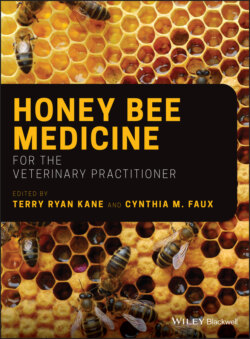Читать книгу Honey Bee Medicine for the Veterinary Practitioner - Группа авторов - Страница 15
One Health Issue: The Global Epidemic of Antimicrobial Resistance
ОглавлениеThere is no doubt that antibiotic use improved the health of people and animals over the last 70 years. Antimicrobial resistance (AMR) is nothing new, it occurs in nature. Resistant genes are carried on plasmids (pieces of DNA) that are transferred between organisms. We now know that bacteria containing resistant genes can be transferred from livestock to humans via food. However, the misuse/overuse of antibiotics has led to the spread of resistant genes in medically important antibiotics and we now have diseases that are resistant to treatment. Multi‐drug resistant bacteria are a threat to global health.
While in much of the world veterinarians have had a decades' long interaction with apiarists, veterinarians in the United States officially joined the honey bee's medical team as a result of the implementation of the 2017 US Food and Drug Administration regulations on the use of medically important antibiotics in livestock. Honey bees were officially defined as food‐producing livestock in those regulations, putting their medical care into the hands of veterinarians. Writing Veterinary Feed Directives and prescriptions, however, should not be our profession's sole offering to honey bee medicine. Our expertise in herd health management will be an asset to the honey bee industry.
Antibiotic resistance has been documented in honey bees and we now know that there can be harmful effects on the honey bee microbiome. There is an increased effort to breed honey bees for hygienic behaviors to develop and enhance natural resistance.
